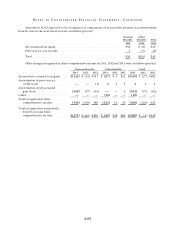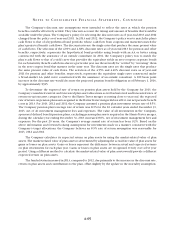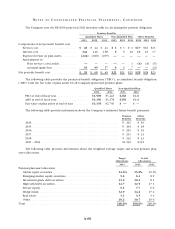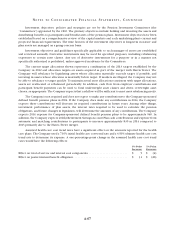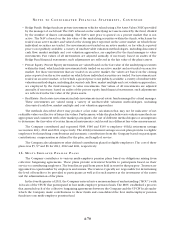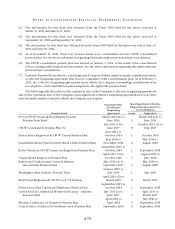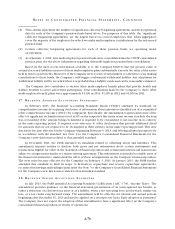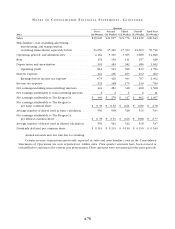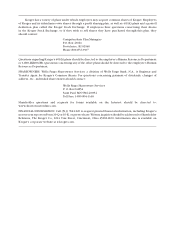Kroger 2013 Annual Report Download - page 143
Download and view the complete annual report
Please find page 143 of the 2013 Kroger annual report below. You can navigate through the pages in the report by either clicking on the pages listed below, or by using the keyword search tool below to find specific information within the annual report.A-70
NO T E S T O C O N S O L I D A T E D F I N A N C I A L S T A T E M E N T S , CO N T I N U E D
• HedgeFunds:HedgefundsareprivateinvestmentvehiclesvaluedusingaNetAssetValue(NAV)provided
by the manager of each fund. The NAV is based on the underlying net assets owned by the fund, divided
by the number of shares outstanding. The NAV’s unit price is quoted on a private market that is not
active. The NAV is based on the fair value of the underlying securities within the funds, which may be
traded on an active market, and valued at the closing price reported on the active market on which those
individual securities are traded. For investments not traded on an active market, or for which a quoted
price is not publicly available, a variety of unobservable valuation methodologies, including discounted
cash flow, market multiple and cost valuation approaches, are employed by the fund manager to value
investments. Fair values of all investments are adjusted annually, if necessary, based on audits of the
Hedge Fund financial statements; such adjustments are reflected in the fair value of the plan’s assets.
• PrivateEquity:PrivateEquityinvestmentsarevaluedbasedonthefairvalueoftheunderlyingsecurities
within the fund, which include investments both traded on an active market and not traded on an active
market. For those investments that are traded on an active market, the values are based on the closing
price reported on the active market on which those individual securities are traded. For investments not
traded on an active market, or for which a quoted price is not publicly available, a variety of unobservable
valuation methodologies, including discounted cash flow, market multiple and cost valuation approaches,
are employed by the fund manager to value investments. Fair values of all investments are adjusted
annually, if necessary, based on audits of the private equity fund financial statements; such adjustments
are reflected in the fair value of the plan’s assets.
• RealEstate:Realestateinvestmentsincludeinvestmentsinrealestatefundsmanagedbyafundmanager.
These investments are valued using a variety of unobservable valuation methodologies, including
discounted cash flow, market multiple and cost valuation approaches.
The methods described above may produce a fair value calculation that may not be indicative of net
realizable value or reflective of future fair values. Furthermore, while the plan believes its valuation methods are
appropriate and consistent with other market participants, the use of different methodologies or assumptions
to determine the fair value of certain financial instruments could result in a different fair value measurement.
The Company contributed and expensed $148, $140 and $130 to employee 401(k) retirement savings
accounts in 2013, 2012 and 2011, respectively. The 401(k) retirement savings account plan provides to eligible
employees both matching contributions and automatic contributions from the Company based on participant
contributions, compensation as defined by the plan, and length of service.
The Company also administers other defined contribution plans for eligible employees. The cost of these
plans was $5, $7 and $6 for 2013, 2012 and 2011, respectively.
1 6 . M U L T I - E M P L O Y E R P E N S I O N P L A N S
The Company contributes to various multi-employer pension plans based on obligations arising from
collective bargaining agreements. These plans provide retirement benefits to participants based on their
service to contributing employers. The benefits are paid from assets held in trust for that purpose. Trustees are
appointed in equal number by employers and unions. The trustees typically are responsible for determining
the level of benefits to be provided to participants as well as for such matters as the investment of the assets
and the administration of the plans.
In the fourth quarter of 2011, the Company entered into a memorandum of understanding (“MOU”) with
14 locals of the UFCW that participated in four multi-employer pension funds. The MOU established a process
that amended each of the collective bargaining agreements between the Company and the UFCW locals under
which the Company made contributions to these funds and consolidated the four multi-employer pension
funds into one multi-employer pension fund.





